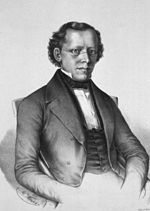Friedrich Arnold, Date of Birth, Place of Birth, Date of Death
TweetFriedrich Arnold
German anatomist and physiologistAbout Friedrich Arnold
- Friedrich Arnold (8 January 1803 – 5 July 1890) was professor emeritus of anatomy and physiology at Heidelberg.
- He read medicine at the University of Heidelberg at the same time as his elder brother, Johann Wilhelm Arnold (1801–1873). Arnold studied anatomy under Friedrich Tiedemann (1781–1861) and Vincenz Fohmann (1794-1837).
- He became a doctor of medicine on 7 September 1825 at Heidelberg, where several years later, he became an associate professor.
- From 1835, he worked at the universities of Zurich, Freiburg and Tübingen, returning to Heidelberg in 1852 as a professor of anatomy and physiology.
- Following his retirement, he was replaced at Heidelberg by Carl Gegenbaur (1826-1903).The auricular branch of the vagus nerve was nicknamed "Arnold's nerve" after he described the reflex of coughing when the ear is stimulated.
- Other eponyms that contain his name are "Arnold's ganglion" (otic ganglion) and "Arnold's canal" (a passage of the petrous portion of the temporal bone for the auricular branch of the vagus nerve.He was also privy counsellor in Heidelberg.
Read more at Wikipedia
See Also
- Famous People's Birthdays on 08 January, Germany
- Famous People's Birthdays in January, Germany
- Famous physician's Birthdays on 08 January, Germany
- Famous physician's Birthdays in January, Germany
- Famous university teacher's Birthdays on 08 January, Germany
- Famous university teacher's Birthdays in January, Germany
- Famous physiologist's Birthdays on 08 January, Germany
- Famous physiologist's Birthdays in January, Germany
- Famous anatomist's Birthdays on 08 January, Germany
- Famous anatomist's Birthdays in January, Germany


 Date of Birth:
Date of Birth:  Place of Birth: Edenkoben, Rhineland-Palatinate, Germany
Place of Birth: Edenkoben, Rhineland-Palatinate, Germany